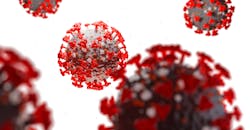Despite the ongoing reopening of all 50 states, extending even to former hotspots like New York City, Dr. Anthony Fauci says the coronavirus pandemic “isn’t over yet.”
Fauci called the virus his “worst nightmare” June 9 in an interview hosted by BIO Digital, citing its high rate of transmissibility as one feature that distinguished it from outbreaks like Ebola and HIV. “I mean, Ebola was scary. But Ebola would never be easily transmitted in a global way,” he said. Fauci expressed hope that a vaccine would be developed rapidly. On June 10, Johnson & Johnson announced they had moved the start date for human trials of the COVID-19 candidate vaccine to the second half of July.
Meanwhile, the rate of new coronavirus infectious is, worryingly, increasing worldwide. June 5 marked a new daily record, with 137,200 new infections recorded on that day alone according to data collected by the Johns Hopkins University of Medicine. According to a Reuters analysis, the total amount of cases in the United States is now more than 2 million.
Reopening and Rethinking Plants in the Social Distancing Era
Manufacturers continue to use innovation to solve the most pernicious post-pandemic problems. When Ericsson began operating its new USA 5G smart factory in Texas, the Swedish networking company used virtual reality to have workers in Tallinn, Estonia train incoming Texas employees. Using VR, said Anna Cau, Ericsson’s head of people, group supply, meant “we could provide our employees essential live interactions with experts and virtually transfer them 8000 km to another Ericsson production site.” Read the full story here.
The post-COVID-19 lockdown might be a boon for worker health and safety, direct manpower planning, and eliminating waste, says Amol Mate, VP for Industrial Systems Business, Altizon Systems. “Being realistic,” says Mate, “does not mean avoiding the unique opportunity to challenge presuppositions on how plants are operated into the future.” Read the full story here.
Corning Wins Funding to Ramp Up Pharmaceutical Vial Production
Pharmaceutical companies around the world are racing to develop, produce, test, and deploy a vaccine for COVID-19. Anticipating supply difficulties, the Biomedical Advanced Research and Development Authority, or BARDA, announced June 9 that they would grant Corning, Inc. $204 million to ramp up production of its glass vials.
Corning, a materials manufacturer that specializes in glass, said that while that some BARDA partners developing vaccines would receive priority access to the vials for use in vaccine development and deployment. Corning’s CEO, Wendell P. Weeks, said in a statement that “Corning is ready to do our part in the fight against the pandemic, as well as to help prepare for future public health emergencies.” Read the full story here.
Manufacturers Reveal More COVID-19 Cost-Control Measures
On June 9, Kennametal, Inc., announced new cost-control measures for weathering the COVID-19 impact. According to CEO Christopher Rossi, the virus has forced Kennametal to accelerate existing plans to reorganize and modernize the company’s operations. The metal tooling company announced a slate of salary cuts and freezes in the face of poor April and May sales. “The steps we are announcing today and the ongoing work we are doing in simplification/modernization position us well for long term success,” said Rossi in a statement. Read the full story here.
Kennametal is far from alone as a manufacturer struggling with the viral recession. Tata Steel’s Dutch operations were shut down June 10 after workers there went on strike at 2pm local strike in order to protest planned job cuts. The Dutch unions told Reuters that Tata has plans to cut 1,000 of its 9,000 Netherland jobs as part of its European reorganization.
About the Author
Ryan Secard
Associate Editor
Ryan Secard joined Endeavor B2B in 2020 as a news editor for IndustryWeek. He currently contributes to IW, American Machinist, Foundry Management & Technology, and Plant Services on breaking manufacturing news, new products, plant openings and closures, and labor issues in manufacturing.
